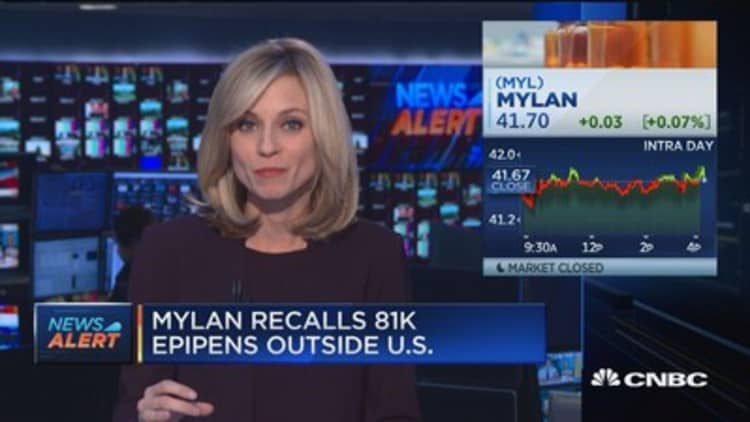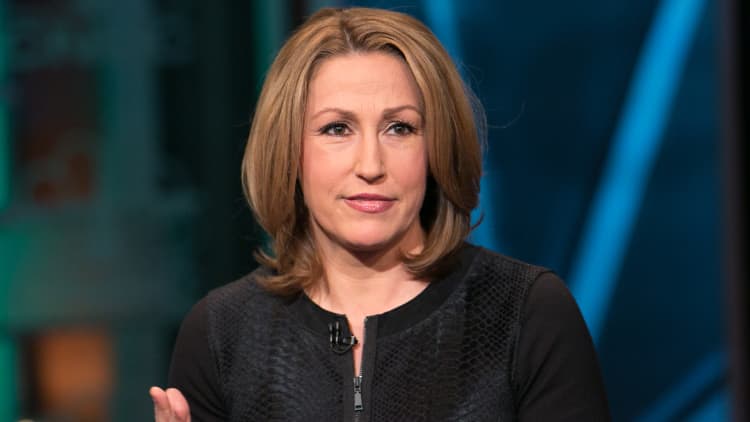Will Mylan pay, or won't Mylan pay?
Mylan is refusing to say if it will begin paying much higher rebates to Medicaid for EpiPen as early as Saturday, as the big drugmaker had previously announced.
If Mylan doesn't start making those higher rebates on EpiPen, it could shortchange federal and state Medicaid programs by millions of dollars each month than they otherwise might have felt entitled to.
Analysts have said Mylan might owe Medicaid rebates that could be as high as nearly 99 percent of its total sales on EpiPen through Medicaid, depending on how the rebate is calculated.
At the bare minimum, the new rate would be 23.1 percent of sales. That's the least amount that brand-name products are required to pay.
But if it continues paying the old rate as of Saturday, Mylan would be paying rebates of just 13 percent of its sales through Medicaid, as generic products owe.

The federal Centers for Medicare and Medicaid Services last fall said that it had repeatedly told Mylan that it should have been paying the higher rate for brand-name medications.
Mylan already has enjoyed a six-month grace period on paying the higher rate after announcing in October that it would pay a $465 million settlement to the U.S. Justice Department to resolve claims it had knowingly shortchanged Medicaid on rebates.
CNBC reported last fall that Mylan may have otherwise owed up to $120 million in rebates during that six-month grace period, which is supposed to end Saturday.
In an 8-K filing in October with the Securities and Exchange Commission, on the heels of the settlement announcement, Mylan had said, "Consistent with the recent CMS rule regarding the classification of drugs for rebate purposes, EpiPen Auto-Injector will begin being classified as an innovator drug on April 1, 2017."
Innovator, or brand-name drugs, pay the higher rebate amount. That same filing also disclosed that the SEC was investigating Mylan in connection with the Medicaid Drug Rebate Program.
Asked this week if Mylan would begin paying the higher rebate rate on Saturday, a company spokeswoman declined to comment.
She also declined to comment on whether the higher rebate rate, whenever the company decides to start paying it, will apply to a generic version of EpiPen the company introduced several months ago.
The spokeswoman, when asked why the $465 million settlement with the U.S. Justice Department has still not been finalized six months after it was announced by the company, declined to comment beyond noting that Mylan previously has said "We are working to finalize the settlement agreement."

A Justice Department spokeswoman declined to comment when asked the status of the settlement.
A spokesman for CMS declined to comment when asked if the agency still expected EpiPen to be subject to the higher rebate on EpiPen starting Saturday.
Sen. Chuck Grassley, R-Iowa, who as chairman of the Senate Judiciary Committee has sought answers from Mylan and CMS for months about EpiPen rebates, on Friday said, "Mylan does business with the taxpayers, and Mylan ought to be transparent in that business."
"It's unclear why the company won't confirm its pledge to pay the higher rebate rate," said Grassley said. "The pledge wasn't just something made casually. It was made in a securities filing. The lack of clarity underscores the need for the Centers for Medicare and Medicaid Services to provide the documents I've requested for months."
The senator also noted that "CMS said it expressly advised Mylan that its classification of the EpiPen was incorrect but has failed to provide any evidence of the communications and what steps it took to enforce the correct rebate amount from Mylan. What steps were taken and what, if anything, is underway to fix the problem? The taxpayers who overpaid possibly hundreds of millions of dollars for a product deserve answers."
The situation stems from the controversy that erupted last summer over Mylan's practice of big price hikes for EpiPen, the auto-injector used to treat a potentially fatal allergic reaction known as anaphylaxis.
Mylan raised EpiPen's retail price by more than 500 percent in recent years, resulting in some customers being faced with a $600 or more sticker price for a two-pack of the device.
Outrage over that cost from consumers and Congress spurred Mylan to increase the amount of financial assistance it gave customers.
The company also later introduced a generic version of EpiPen that sold for half of the price of the brand-name product.
Amid the controversy, a number of congressmen and other officials raised the question of whether Mylan had, for years, shortchanged Medicaid on rebates the company owed for EpiPen sales.
Medicaid is the massive health program that covers primarily poor people, and is jointly run by states with the federal government.
Pharmaceutical companies that want to sell their products through Medicaid participate in a program that requires them rebate Medicaid a share of their revenue from such sales. The rebates are split between federal and state Medicaid programs.
The Medicaid Drug Rebate program imposes a 13 percent rebate on generic drugs. But sellers of brand-name drugs are required to pay a rate of at least 23.1 percent. However, the rebate for brand-name medications can be higher — much higher — if their sellers have raised the price of the product beyond the rate of inflation.
If Mylan treated EpiPen as a brand-name product for the purposes of the rebate program, it would have been subject to a much higher rebate than the 23.1 percent minimum because of its price hikes over the years.
The actual rebate rate could nearly equal the total value of the sales of EpiPen, because of adjustments due to price hikes higher than inflation.
But Mylan for years paid only the 13 percent rebate rate imposed on generics.
The company, after questions were raised about that, repeatedly denied it should have been paying the brand-name rebate rate.
Mylan said longstanding guidance from CMS indicated EpiPen could be classified as a generic.
But CMS in October said the agency had repeatedly informed Mylan that the company had been been misclassifying EpiPen as a generic, and thus was shortchanging Medicaid.
Then CMS-Chief Andy Slavitt told Congress that Medicaid had paid Mylan more than $700 million for EpiPen, after the lower rebates were factored in, from 2011 through 2015.
Slavitt said at that time that CMS could not say how much the agency believed Mylan had underpaid Medicaid during that time period.
But an analysis by Evercore ISI found that if Mylan knowingly underpaid Medicaid from 2011 onward, the company could be forced to pay more than $700 million in rebates, in addition to penalties under the False Claims Act.
Hours after CNBC posted a story about the Evercore analysis, Mylan announced its $465 million settlement with the Justice Department.
The company, which did not admit any wrongdoing, said in its later 8-K filing that the settlement terms resolve "all potential liability claims by federal and state governments as to whether the product should have been classified as an innovator drug for CMS purposes, and subject to the higher rebate formula."
Mylan's stock soared on the heels of the deal being announced.
But since then, the Justice Department has refused to release the terms of the deal, or say whether it has been finalized.
Watch: Mylan CEO touts the company



